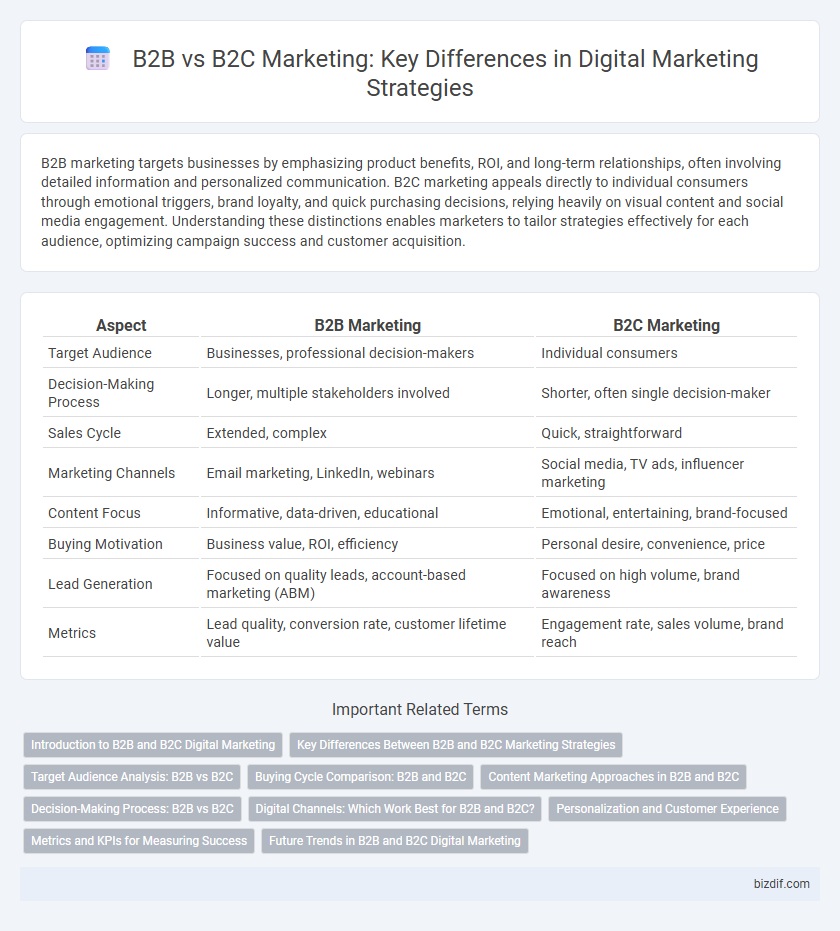B2B marketing targets businesses by emphasizing product benefits, ROI, and long-term relationships, often involving detailed information and personalized communication. B2C marketing appeals directly to individual consumers through emotional triggers, brand loyalty, and quick purchasing decisions, relying heavily on visual content and social media engagement. Understanding these distinctions enables marketers to tailor strategies effectively for each audience, optimizing campaign success and customer acquisition.
Table of Comparison
| Aspect | B2B Marketing | B2C Marketing |
|---|---|---|
| Target Audience | Businesses, professional decision-makers | Individual consumers |
| Decision-Making Process | Longer, multiple stakeholders involved | Shorter, often single decision-maker |
| Sales Cycle | Extended, complex | Quick, straightforward |
| Marketing Channels | Email marketing, LinkedIn, webinars | Social media, TV ads, influencer marketing |
| Content Focus | Informative, data-driven, educational | Emotional, entertaining, brand-focused |
| Buying Motivation | Business value, ROI, efficiency | Personal desire, convenience, price |
| Lead Generation | Focused on quality leads, account-based marketing (ABM) | Focused on high volume, brand awareness |
| Metrics | Lead quality, conversion rate, customer lifetime value | Engagement rate, sales volume, brand reach |
Introduction to B2B and B2C Digital Marketing
B2B digital marketing targets businesses with strategies centered on relationship-building, longer sales cycles, and detailed content tailored to decision-makers. B2C digital marketing focuses on engaging individual consumers through emotional appeals, quick conversions, and high-impact visual campaigns. Understanding these distinct approaches is essential for optimizing digital marketing efforts in each sector.
Key Differences Between B2B and B2C Marketing Strategies
B2B marketing strategies prioritize relationship-building, targeting decision-makers through personalized content, in-depth product information, and longer sales cycles, whereas B2C strategies focus on emotional appeal, brand loyalty, and quick conversions via mass media and social platforms. B2B campaigns often rely on LinkedIn, webinars, and white papers to educate buyers, while B2C leverages Instagram, influencer marketing, and promotions to capture consumer interest instantly. Understanding these differences helps optimize resource allocation and messaging for effective audience engagement in each market.
Target Audience Analysis: B2B vs B2C
Target audience analysis in B2B marketing centers on understanding organizational needs, decision-making processes, and industry-specific pain points, often targeting multiple stakeholders within a company. In contrast, B2C marketing emphasizes individual consumer behavior, preferences, and emotional triggers, focusing on personal needs and lifestyle choices. Effective segmentation in B2B leverages firmographics and buyer personas, while B2C relies heavily on demographics and psychographics to tailor messaging and campaigns.
Buying Cycle Comparison: B2B and B2C
The B2B buying cycle is typically longer and involves multiple decision-makers, requiring in-depth product information and relationship-building strategies, whereas B2C buying cycles are shorter and driven by emotional impulses and immediate needs. B2B marketers prioritize educating prospects through detailed content such as whitepapers, case studies, and webinars, while B2C marketing relies heavily on engaging visuals, social proof, and promotional offers. Understanding these distinct buying behaviors enables digital marketers to tailor campaigns effectively for each audience, optimizing conversion rates and customer retention.
Content Marketing Approaches in B2B and B2C
B2B marketing emphasizes content that builds expertise and nurtures long-term relationships, utilizing whitepapers, case studies, and webinars to demonstrate industry authority and solve complex business problems. B2C marketing focuses on emotional appeal and quick engagement, leveraging visually compelling social media posts, influencer collaborations, and short-form videos to drive immediate consumer action and brand loyalty. Tailoring content to the decision-making process and buyer personas is crucial for maximizing engagement and conversion in both B2B and B2C strategies.
Decision-Making Process: B2B vs B2C
The decision-making process in B2B marketing typically involves multiple stakeholders, longer evaluation periods, and a focus on ROI and efficiency, reflecting complex organizational needs. In contrast, B2C marketing decisions are often quicker, driven by emotional triggers and personal benefits, with buyers influenced by brand perception and ease of purchase. Understanding these distinct decision-making dynamics enables digital marketers to tailor strategies effectively for each audience.
Digital Channels: Which Work Best for B2B and B2C?
Digital marketing channels for B2B typically prioritize LinkedIn, email marketing, and industry-specific webinars due to their professional networking and lead generation potential. In contrast, B2C marketing excels on platforms like Instagram, Facebook, and TikTok, which leverage visual content and influencer partnerships to engage a broad consumer audience. SEO and content marketing remain crucial for both B2B and B2C, but the messaging and targeting strategies differ significantly to match audience intent and decision-making processes.
Personalization and Customer Experience
B2B marketing emphasizes personalization through account-based strategies and tailored content that addresses complex buyer needs, enhancing long-term relationships and trust. In contrast, B2C marketing leverages high-volume data analytics and behavioral targeting to deliver personalized, emotionally engaging experiences that drive immediate consumer actions. Optimizing customer experience in B2B involves in-depth customer journeys and decision-making processes, whereas B2C prioritizes seamless, intuitive interactions across multiple digital touchpoints.
Metrics and KPIs for Measuring Success
B2B marketing metrics emphasize lead quality, conversion rates, and customer lifetime value, reflecting longer sales cycles and relationship-driven strategies. In contrast, B2C marketing prioritizes metrics like website traffic, engagement rates, and purchase frequency due to higher transaction volumes and shorter decision-making processes. Both approaches rely on ROI and customer acquisition cost (CAC) to evaluate campaign effectiveness and optimize marketing spend.
Future Trends in B2B and B2C Digital Marketing
Future trends in B2B digital marketing emphasize personalized account-based marketing, leveraging AI-driven analytics, and integrating multi-channel campaigns to enhance lead generation and customer retention. B2C marketing is rapidly evolving with the adoption of immersive technologies like augmented reality, voice search optimization, and hyper-personalized content powered by advanced AI algorithms. Both sectors increasingly prioritize data privacy compliance and leveraging big data to create more targeted, effective marketing strategies that drive ROI.
B2B marketing vs B2C marketing Infographic

 bizdif.com
bizdif.com